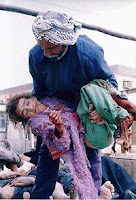
At the end of November last year, the BBC World Service made a Freedom of Information Request. Almost 4 months later, the requested information was finally released, and the BBC reported the findings on Monday.
Their revelation is shocking and disheartening. Yet strangely, coverage has been minimal. I can only hope this is due to the inevitably headline-grabbing Iranian-captive story, not some more sinister working of our government's political PR machine.
In brief: in October last year, respected British medical journal The Lancet published a breathtaking statistic: the total Iraqi death-count since the war began was at least 655,000. To put the figure in some sort of perspective, that's an average of over 500 people EVERY DAY.
At the time, the public was advised not to take the report seriously. Blair said the figure "wasn't anywhere near accurate". The Foreign Office questioned the Lancet's technique: "It is a fairly small sample they have taken and they have extrapolated it across the country". Stateside, President Bush was similarly dismissive: "I don't consider it a credible report." Hardly surprising, considering that in December 2005, Bush had suggested the death toll was only "30,000 more or less".
So what did those determined researchers at the BBC find out?
Here's Owen Bennett Jones from the World Service, writing in The New Statesman:
The documents, released to the BBC World Service, show civil servants suggesting that ministers should not "rubbish" the Lancet report. In one email, an official, apparently from No 10 but whose name has been blanked out, asks: "Are we really sure the report is likely to be right? That is certainly what the brief implies."Another nameless official replies: "We do not accept the figures quoted in the Lancet survey as accurate", but goes on to say: "The survey methodology used here cannot be rubbished, it is a tried and tested way of measuring mortality in conflict zones."
The documents advise ministers to use figures from the Iraqi health ministry, which estimates the number of deaths at less than 10 per cent of the Lancet's figure.The ministry in Baghdad relies on hospitals to report the number of victims of terrorism or military action. But, critics say, the ministry did not start counting until well after the invasion and required busy hospital staff to report daily. A statistician at the Department for International Development was also asked for an opinion of the Lancet study. The techniques used were "tried and tested", he said. If anything, the method "should lead to an underestimation of the deaths in the war and early post- invasion period".
In fact, chief scientific adviser to the Defense Ministry, Roy Anderson, called the report's methods "robust... close to best practice". And in the memo that the BBC obtained, Anderson's office told senior officials that the chief scientist "recommends caution in publicly criticizing the study."
At which point, Blair and Bush decided to publicly criticize the study.
There's something incredibly depressing about a government that not only made a terrible mistake by going into war in the first place, without a UN mandate or a referendum, but could not even do their war's innocent victims the justice of acknowledging their deaths. You'd think the existence of the Freedom of Information Act would discourage officials from ignoring their own experts' written advice, but then again, the way this story has been underreported suggests they don't need to worry.
Wednesday, 28 March 2007
Death Toll in Iraq
Subscribe to:
Post Comments (Atom)



No comments:
Post a Comment